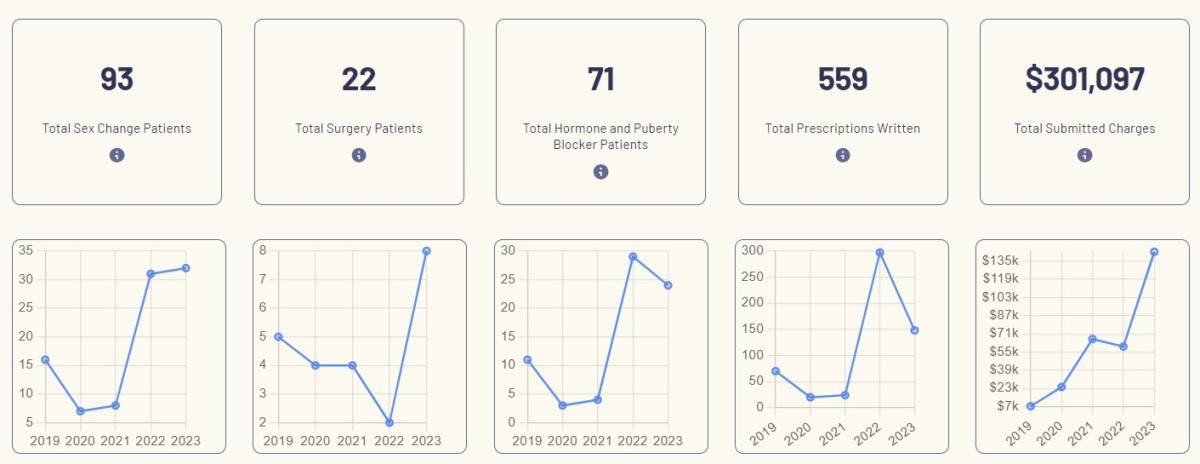(The Sentinel) — There are 93 juvenile patients receiving gender-affirming treatment in Kansas, 22 of whom have had surgery and 71 of whom are on puberty blockers, according to a new database launched on Oct. 8, 2024, by the national policy group “Do No Harm.“
“It’s far too easy for a child … to obtain … prescriptions for the puberty blockers and cross-sex hormones — or even to go through the surgical process,” Beth Serio, a spokeswoman for Do No Harm, said in a phone interview. “It’s a bit of a cliche now, but it’s a cliche for a reason that, you know, we don’t want a 14-year-old to get a tattoo, because we know that they cannot properly consent to what they are doing to their bodies. Unfortunately, we do allow 14-year-olds to cut off their healthy breasts because they’re so sure that they don’t want to be a girl anymore. “It’s all very much in service to this ‘woke’ ideology that’s very pervasive in the healthcare industry, and it’s kind of led us to where we are with this industry of (transitioning) children.”
The Do No Harm database shows that several facilities in the Sunflower State have been providing prescriptions and surgeries to minors seeking gender-affirming treatment.
For instance, Saint Luke’s South Surgery Center in Overland Park has had seven surgery patients at a total billing of $156,547.
Stormont Vail in Topeka has had the most pediatric sex change patients, treating 18 patients with hormones or puberty blockers. The University of Kansas Hospital comes in second with 17 patients, eight of whom have had surgery and nine of whom are on hormones or puberty blockers.
In total, Kansas hospitals and clinics have billed out $301,097 between 2019 and 2023, the last year for which figures were available.
Generally speaking, there was a sharp rise in the number of pediatric sex-change patients in Kansas starting in 2022.

Nationwide, since 2019, 13,994 children received sex change-related treatments; 5,747 sex change surgeries have been performed on children; 62,682 hormone and puberty blocker prescriptions were written for 8,579 pediatric patients, and at least has $119,791,202 made from sex change treatments performed on minors.
These “treatments” disproportionately affect girls, Serio said.
“The most common surgical procedure is a double mastectomy,” she said. “I think that’s not too surprising because we do know that in those early teenage years that, demographically, the majority of children who are experiencing gender dysphoria and want to go down the road of transitioning socially and medically tend to be young girls. Those demographics change in adulthood, but for children, we know that it is more common in females, so it’s not too surprising that the number one procedure is going to be a mastectomy.”
Surrounding states tend to have higher gender-affirming treatment numbers
Missouri, with three major children’s hospitals, unsurprisingly has more patents than Kansas, with 182 in total, 44 surgery patients, and 139 on hormones or puberty blockers. Most—49—are at St. Louis Children’s Hospital, but 34 are at Children’s Mercy in Kansas City, Missouri, as well.
Despite also having a major children’s hospital and a larger population, Oklahoma has fewer cases than Kansas at 64 total, with 18 having surgery and 46 on medication.
Nebraska likewise is lower than Kansas, with 50 patients, 11 surgeries, and 39 on puberty blockers or hormones.
Colorado, however, is one of the leading states for pediatric gender transition, with 297 total patients, 60 surgeries, and 240 patients on hormones or puberty blockers.
The majority — 120 — of the Colorado patients are at Children’s Hospital Colorado in Aurora, Colorado, which is listed by Do No Harm as one of the “Dirty Dozen” hospitals that perform the most juvenile gender transitions in the country.
It is worth noting that Missouri, Oklahoma, and Nebraska all have laws limiting the age at which “gender-affirming care” can be provided—although those laws vary by state. Kansas and Colorado have no such restrictions. For instance, as of Oct. 1, 2023, Nebraska limits the age at which surgery can be performed but places no restrictions on puberty blockers or hormones. Missouri, however, placed age limits on all sex-change treatments for minors.
The other “Dirty Dozen” hospitals are in California, Oregon, Minnesota, Ohio, Connecticut, Washington DC, and Massachusetts.
In all, 22 states have some sort of age limit on gender-affirming care for minors.
“With the launch of the Stop the Harm Database, Do No Harm is building on our mission to expose the dangers of experimental pediatric gender medicine and bring the practice to an end,” said Do No Harm Chairman Dr. Stanley Goldfarb. “This first-of-its-kind project provides patients, families, and policymakers with a resource that reveals the pervasiveness of irreversible sex-change treatments for minors in America. While this data represents the tip of the iceberg, this is the first step in holding the medical establishment accountable for participating in, and oftentimes promoting, predatory and unscientific medical interventions for vulnerable children.”
The methodology
Do No Harm constructed the database by analyzing thousands of insurance claims from hospitals and healthcare facilities. Do No Harm also examined the websites and publicly available information for each of the profiled children’s hospitals to determine which gender-affirming services they offer.
Do No Harm identified procedure codes and national drug codes (NDC) commonly used in “gender-affirming care.” These codes were collected from multiple data sources, and include data from commercial insurance providers, Medicaid, Medicare, and the Department of Veterans Affairs and exclude data from internal Kaiser Permanente and internal Department of Veterans Affairs claims. The procedure codes and NDC codes were reviewed and assigned corresponding confidence levels to indicate the likelihood they were directly related to a gender-related condition. This process was then reviewed by multiple medical professionals and cross-referenced with patient diagnoses for gender-related conditions to accurately determine which procedures and drugs were used for gender medical interventions.

